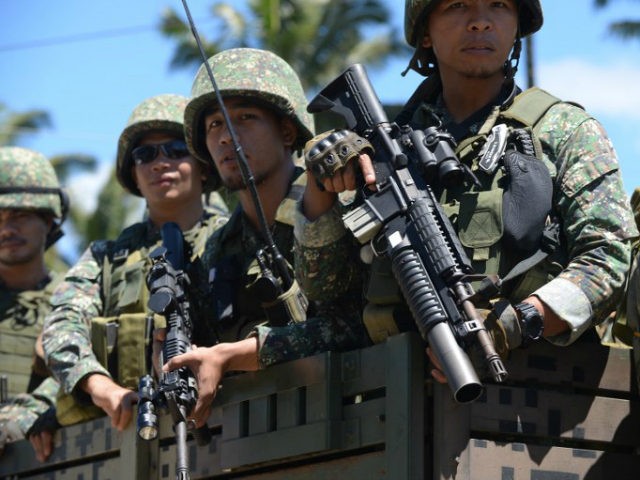The Philippines has been battling to eradicate the Islamic State’s (ISIS) presence from its southern chain of islands as the terrorist organization seeks to secure its hold over the Islamic City of Marawi on the island of Mindanao.
The city was taken over by the pro-ISIS Maute terrorist group, named after brothers Omar and Abdullah Maute, in May, prompting President Rodrigo Duterte to declare martial law there. The Philippines Congress later voted to extend the martial law designation beyond the 60-day limit and until the end of the year.
On Thursday, Philippines media reported that six members of Maute were confirmed killed in the main battle area in Marawi City, bringing the number of militants killed since the battle began more than 100 days ago to 759. So far, the Philippines has lost 155 troops.
Marawi was once home to 200,000 people and was the largest Muslim-majority city in the Philippines, an overwhelmingly Roman Catholic nation. However, tens of thousands of former residents have fled what has become a city of ruins and the center of a deadly battle where Islamic State loyalists have sought to establish their own mini-caliphate in Asia.
Sidney Jones, the Jakarta-based director of the Institute for Policy Analysis of Conflict, told the Guardian in May:
Duterte and his government have failed to appreciate that a major change has taken place in Mindanao, and these men aren’t motivated just by clan politics or money. The leaders may have been “bandits” in the past, but now, they’re ideologues. They have been convinced by Isis that the answer to Mindanao’s problems is Islamic law.
Last week, Duterte’s Defense Secretary Delfin Lorenzana announced that the security crisis in Marawi “could be over at the end of this month” after security forces asked for more time when they failed to meet the announced September 30 deadline to retake the city from the Islamic State-inspired terrorists.
Duterte reportedly told reporters Saturday that he sees the Marawi situation ending by December. “I have until the end of the year to contain this thing,” Duterte reportedly said, adding:
You know, the Marawi [crisis] is ending. What’s prolonging it is our effort to save the lives of everybody, including the terrorists if possible. I objected, I ruled out the bombing of mosques because destroying that could mean the destruction of what’s in the soul of Muslims everywhere.
Joint Chiefs Vice Chairman General Paul Selva told the Senate Armed Services Committee last month:
In every case where we see the resurgence of terror networks, particularly in the fragile areas of the southern Philippines, I think it’s worth considering whether or not we reinstate a named operation, not only to provide for the resources that are required, but to give the Pacific Command commander and the field commanders in the Philippines the kinds of authorities they need to work with indigenous Philippine forces to actually help them be successful in that battlespace.
In June, the Pentagon announced it was considering airstrikes against Islamic State militants in the Philippines. However, Lorenzana and Armed Forces Eduardo Año denied this and suggested that the Mutual Defense Treaty with the United States would block such a measure from occurring.

COMMENTS
Please let us know if you're having issues with commenting.